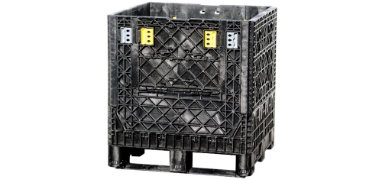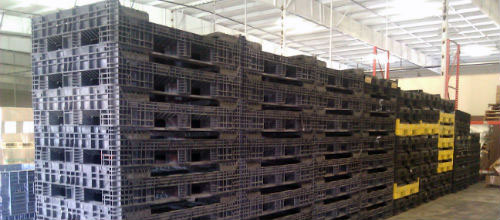Why Bulk Containers Are Crucial for Sustainable and Cost-efficient Transportation
Mass containers play an important duty in contemporary logistics. They assist in the efficient movement of huge quantities of goods, therefore enhancing transport processes. This technique not only reduces expenses however likewise lessens environmental effect through reduced exhausts and waste generation. As markets look for even more sustainable techniques, the adoption of bulk containers is coming to be increasingly significant. What effects does this shift hold for future logistics and supply chain monitoring?

The Benefits of Utilizing Mass Containers in Logistics
Mass containers transform logistics by enhancing performance and sustainability. These containers permit the transport of huge quantities of items in a single journey, significantly minimizing the variety of journeys required. This not only simplifies procedures but additionally reduces labor prices connected with handling, packing, and dumping. On top of that, mass containers are developed to optimize space use within transport vehicles, making sure that more items can be delivered all at once.
The standardization of mass containers likewise streamlines the logistics process. With consistent dimensions, they can be easily stacked and kept, resulting in improved stockroom monitoring. Furthermore, bulk containers often feature long lasting products that shield materials from damage throughout transportation, consequently reducing product loss and boosting total integrity. Consequently, businesses can experience boosted supply chain performance, ultimately bring about boosted earnings and client satisfaction. This mix of factors makes bulk containers an essential possession in modern-day logistics.
Ecological Impact: Lowering Waste and Carbon Footprint
As sectors increasingly prioritize sustainability, the adoption of mass containers has actually become a vital approach for reducing waste and lowering carbon footprints. These containers minimize making use of packaging products, such as boxes and plastic, thus especially reducing total waste generation. By consolidating deliveries, mass containers boost transportation effectiveness, permitting for even more items to be delivered per trip. This decrease in journeys directly associates with lower greenhouse gas discharges, adding to a smaller carbon footprint.
In addition, mass containers can frequently be reused or reused, further reducing ecological influence. The longevity of these containers guarantees they can stand up to several transportation cycles, reducing the need for single-use options. refurbished bulk containers. By improving logistics and promoting efficient source usage, bulk containers not only sustain lasting methods but likewise motivate sectors to straighten with international ecological objectives. Eventually, their application shows a dedication to environmental stewardship and responsible resource monitoring
Expense Cost Savings: How Mass Containers Lower Transportation Costs
While numerous business seek methods to enhance their profits, using mass containers presents a considerable chance for lowering transport costs. Bulk containers maximize the volume of goods carried, allowing companies to deliver bigger amounts simultaneously. This performance lowers the variety of trips required, straight decreasing gas costs and decreasing labor costs connected with loading and dumping.
In addition, mass containers usually feature streamlined designs that enhance room utilization within transportation vehicles. This suggests fewer voids, bring about much more reliable use offered ability. The resilience of mass containers can decrease the threat of product damage throughout transit, reducing losses and ensuring that more items arrive undamaged.
Enhancing Supply Chain Performance With Mass Storage Space Solutions
Mass storage solutions play a crucial function in enhancing supply chain effectiveness by maximizing inventory administration. By combining items right into fewer, bigger containers, companies can greatly lower dealing with costs related to constant transfers and processing. This structured technique permits much better tracking and administration of stock, eventually resulting in enhanced operational performance.
Structured Stock Administration
Efficient stock management is important for optimizing supply chain operations, particularly when companies take on bulk storage space services. These solutions make it possible for businesses to keep higher supply degrees while reducing the frequency of replenishment. By combining products into mass containers, business can simplify their stock processes, minimizing the complexity connected with tracking numerous smaller sized plans. This strategy promotes precise stock counts and enhances projecting precision, enabling more informed decision-making. On top of that, bulk storage space options simplify storage facility company, making it simpler to locate and accessibility items when required. As an outcome, organizations can achieve an extra effective inventory turn over price, eventually enhancing total supply chain performance and minimizing the likelihood of stockouts or overstock scenarios.

Minimized Handling Prices
The application of mass storage solutions not just improves supply management however also substantially reduces taking care of costs throughout the supply chain. By settling products into mass containers, firms minimize the need for regular handling and transfer in between different storage space and transport devices. This method minimizes labor prices connected with loading, unloading, and relocating smaller sized plans. In addition, mass storage space lowers the regularity of deliveries, bring about lower transportation costs and decreased fuel consumption. Therefore, businesses can optimize their logistics operations, enabling for an extra effective allowance of sources. Eventually, minimized managing expenses add to enhanced overall supply chain performance, cultivating an atmosphere that sustains Continue both sustainability and financial practicality.

Convenience of Mass Containers Across Various Industries
Several industries have distinct requirements for transportation and storage space, mass containers have actually arised as a functional solution that meets a broad array of demands. These containers, ranging from huge containers to specialized storage tanks, can fit diverse products, including granules, fluids, and powders. In the farming sector, mass containers help with the transport of grains and fertilizers, while the food and beverage industry utilizes them for ingredients and completed products. The chemical industry relies on bulk containers for securely carrying harmful materials, making certain conformity with safety and security guidelines. Furthermore, building firms gain from bulk containers for delivering aggregates and various other products. Their versatility encompasses various settings of transport, consisting of trucks, ships, and trains, improving logistical efficiency. This versatility not just enhances operations throughout various industries but additionally promotes sustainability by reducing product packaging waste and optimizing room en route. For that reason, bulk containers play an essential duty in contemporary supply chain management.
Future Patterns wholesale Container Use and Sustainability
The future of bulk container use is increasingly formed by innovative materials development that improves sustainability. Furthermore, automation in logistics guarantees to enhance procedures, minimizing waste and improving efficiency. Embracing round economic climate practices will additionally transform exactly how bulk containers are designed, used, and reused, fostering a more lasting transportation landscape.
Ingenious Materials Development
As industries significantly focus on sustainability, ingenious products growth in mass containers becomes a substantial consider enhancing environment-friendly transportation services. Producers and scientists are discovering biodegradable plastics, recycled composites, and lightweight steels to lower ecological effect. These materials not just decrease waste but also enhance fuel effectiveness by decreasing the overall weight of containers. Furthermore, advancements in smart materials, which can adapt to varying conditions, improve the longevity and functionality of mass containers. The assimilation of these innovative materials lines up with circular economic climate principles, promoting reuse and recycling. As the demand for sustainable practices expands, the advancement of such products will certainly play a crucial function in forming the future of mass container usage in logistics and transportation.
Automation in Logistics
Considerable innovations in automation are positioned to change logistics and the application of mass containers, boosting go to my blog sustainability in transport. Automated systems, including drones and self-governing cars, are improving the motion of bulk containers, decreasing the reliance on traditional fuel-powered transportation. These modern technologies enhance directing and loading procedures, enhancing and reducing empty miles gas effectiveness. Furthermore, automated inventory monitoring systems improve tracking and tracking of bulk containers, making sure far better source allowance and lowered waste. The combination of the Internet of Points (IoT) allows real-time data evaluation, allowing proactive decision-making that straightens with sustainability goals. As automation remains to develop, it is anticipated to drive further technologies in mass container usage, eventually supporting more lasting logistics techniques and lowering the environmental effect of transport.
Circular Economic Situation Practices
Improvements in automation are setting the stage for a much more incorporated technique to round economic climate methods in the domain of mass container usage. As industries significantly embrace sustainability, bulk containers are being made for longevity and reusability. This shift not just minimizes waste but additionally boosts resource efficiency. Business are taking on techniques such as closed-loop systems, where utilized containers are collected, refurbished, and reestablished right into the supply chain. Additionally, wise read what he said modern technologies track container life process, promoting better administration and lowering environmental impact. The partnership in between suppliers, logistics companies, and end-users is crucial in developing requirements for lasting container usage. used collapsible bulk containers. Future patterns suggest an expanding focus on products that are recyclable and biodegradable, more reinforcing the circular economy's principles wholesale transportation
Often Asked Concerns
What Materials Are Mass Containers Generally Made From?
Bulk containers are commonly built from sturdy materials such as high-density polyethylene, cardboard, light weight aluminum, and steel. These materials supply toughness, protection, and flexibility, making them suitable for transporting various goods in different industries efficiently.
How Do I Select the Right Size Mass Container?
Picking the right size bulk container includes examining the quantity of materials to be delivered, thinking about taking care of tools compatibility, and assessing storage space demands. Appropriate dimension guarantees performance in transport and lessens waste throughout shipment.
Are Mass Containers Reusable or Recyclable?
Bulk containers are often reusable, developed for several journeys, boosting sustainability. Lots of can additionally be recycled, relying on the materials used. Choosing recyclable alternatives further decreases and sustains ecological goals waste in transport practices.
What Safety And Security Laws Put On Mass Container Transportation?
Safety guidelines for bulk container transport consist of compliance with the Department of Transport standards, proper labeling of unsafe materials, architectural stability evaluations, and adherence to weight limits to assure risk-free handling and avoid accidents throughout transit.
Just How Can Organizations Shift to Using Mass Containers Effectively?
Companies can transform to bulk containers by reviewing existing logistics, training personnel on handling, buying appropriate devices, optimizing supply administration, and collaborating with vendors to assure compatibility and efficiency throughout the supply chain.
As markets progressively focus on sustainability, the fostering of mass containers has arised as a vital technique for minimizing waste and lowering carbon footprints. By combining products into bulk containers, firms can streamline their stock procedures, lowering the complexity associated with tracking several smaller sized plans. As industries increasingly prioritize sustainability, ingenious materials development in bulk containers emerges as a substantial factor in improving green transportation solutions. Automated systems, including drones and self-governing automobiles, are streamlining the motion of mass containers, reducing the reliance on conventional fuel-powered transportation. Additionally, automated inventory administration systems improve monitoring and monitoring of mass containers, ensuring better resource appropriation and minimized waste.